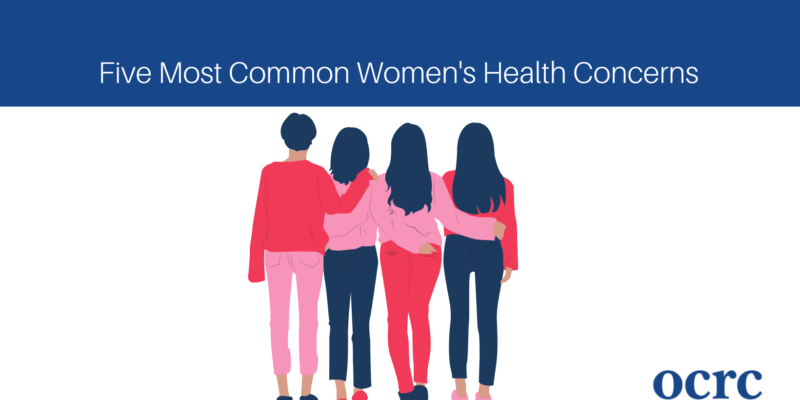
Every May, Women’s Health Month presents a valuable opportunity for women to take charge of their health. By understanding the health issues that disproportionately impact women and those that pose potential life-threatening risks, women can take the proper actions to protect their well-being.
Here are five prevalent women’s health concerns and proactive measures that can help with early detection:
Over 60 million women in the United States have some form of heart disease. This disease is the leading cause of death for women, and it can affect women of all ages.
The most common types of heart disease in women are:
Plaque buildup in the walls of the arteries that supply blood to your heart can cause coronary artery disease. The hormonal changes that women experience during menopause put women at a higher risk of this condition.
Heart failure is when your heart is too weak to pump blood, a serious condition that requires immediate assistance. Arrhythmia is a condition in which your heart beats too fast, too slowly, or in an irregular way.
Routine appointments with a cardiologist can help you monitor changes in your heart health.
More than 3.8 million women in the United States have a history of breast cancer. Breast cancer is a disease that causes breast cells to grow uncontrollably. There are many types of breast cancers, but the two most common ones are invasive ductal carcinoma and invasive lobular carcinoma.
One of the most important tools in women’s health is breast cancer screenings because they can help catch the disease in its early stages.
Reproductive health issues can have a huge impact on women’s health, affecting your quality of life and even overall health.
The most common reproductive health issues in women are:
Endometriosis is when the tissue that lines the uterus begins to grow somewhere else. It can grow behind the uterus, on the ovaries, or on the bladder, leading to pain, very heavy periods, and infertility.
Uterine fibroids are small masses made up of muscle cells and other kinds of tissue, and they grow in and around the uterus. They can cause painful periods, pain during sex, and more issues.
Gynecological cancers can include cervical, ovarian, vaginal, vulvar, and uterine cancers, while interstitial cystitis is a chronic bladder condition that causes severe pelvic or bladder pain. And polycystic ovary syndrome occurs when the ovaries and adrenal glands in women produce more male sex hormones than normal.
Visit your gynecologist regularly to stay on top of your reproductive health.
Women are up to two times more likely to suffer from depression than men and five times more likely to suffer from anxiety.
Some of the most common symptoms of depression include:
Major depressive disorder is the most commonly diagnosed type of depression in women, with postpartum depression coming at a close second.
Some common symptoms of anxiety include:
Many types of anxiety disorders exist that can impact women’s health. Generalized anxiety disorder is one type that causes excessive anxiety affecting all aspects of your life, while panic disorder causes frequent panic attacks.
Obsessive-compulsive disorder is another common type of anxiety that traps you in a cycle of obsessions and compulsions. Social anxiety involves feelings of extreme self-consciousness in social situations, while PTSD is an anxiety disorder that can occur after experiencing trauma.
Your doctor or mental health professional are both valuable resources for protecting your mental health.
In addition to reproductive concerns, there are other gynecological health issues that can also impact women’s health.
Other common gynecological problems women face are:
You want to schedule regular appointments with your gynecologist both during and after your reproductive years.
By getting regular checkups and having screenings for common women’s health conditions, you can help keep yourself healthy and live a long and productive life.
This Women’s Health Month, we encourage you to learn more about the types of health issues women face and consider participating in a clinical study to help the medical field develop improved treatment options. Contact us today to learn more.
